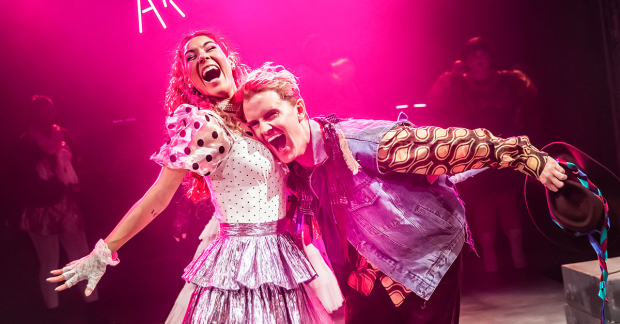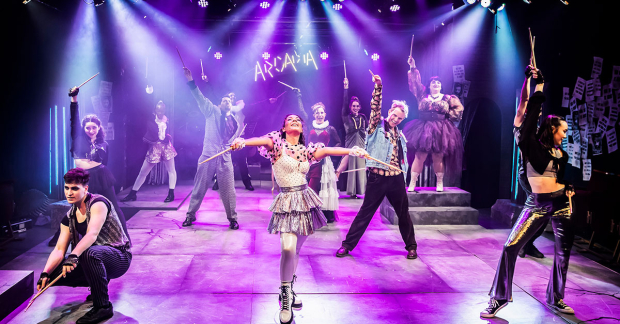”Head Over Heels” review – the Go-Go’s musical is far from sure-footed

© Pamela Raith
Eighteen of their songs are chosen for this jukebox musical, adapted by James Magruder from Jeff Whitty’s original book. There’s no logical build-up to introduce or transition between each of them. They could feasibly be played in any conceivable order, and are grafted onto a romantic epic from the 1580s. Philip Sidney’s The Countess of Pembroke’s Arcadia – about a king who tries to outrun the prophesied collapse of his kingdom – is used as the barest of scaffolding for the tenuously connected songs, but is also not clearly told. Director Tom Jackson Greaves invests more in the choreography and musical numbers than the narrative scenes, so they’re left as shapeless, purposeless romping.
The Go-Go’s and Arcadia are also two very different, discordant beats. The production tries to wrestle it into a punkish anarchic edge, suggested by the crumbling columns with streaks of neon light at the edges of Sophia Pardon’s set. But the two switching registers, lyrical verse dialogue and contemporary songs, clash. It’s also crucially missing the beat of narrative, oscillating indiscriminately between characters without driving through the jumble of subplots, relationships and romances. The key turning points are quite literally semaphored, with the four prophecies labelled on hanging dresses, inviting us to work it all out and wait expectantly for them to be checked off.
The characters themselves are paper-thin caricatures: the overprotective, toothless king; the innocent, stifled daughter; the lowly, virtuous suitor; the jealous, tempestuous sister. It tries to shake this up with a non-binary oracle, played by Iz Hesketh with ethereal lissom movement as fluid as gender, and a lesbian couple (although the production is consistently determined for them to only hug while the other couples actually embrace).

© Pamela Raith
However, its juvenile humour neuters its progressive gender attitudes and politics. Pamela grapples with her sexuality in a poem that rhymes “China”, “runt” and “wits” with slang for the female body. When it has a sudden, momentary flash of creativity with shadow puppets, it’s only to offer another cheap sexual gag.
Its farce – light slapstick, mistaken identities and frumpish costumes – is reinforced by Fed Zanni’s zany facial expressions with eyes that bulge in horror and eyebrows that move like windscreen wipers, as well as Luke Bayer’s sheepish chuckles as the milquetoast peasant shepherd. But it also often asks to be taken seriously, such as a deliberately foolish sword fight ending in one of the characters being draped in a burial sheet while the cast stand dolefully in mournful song.
It’s frothy and, as Basilius says, “all flash, no substance”, but they are flashes nonetheless of pep. Jackson Greaves’ energetic choreography never loses the beat which the dancers amplify with stomping feet and clapping hands. It becomes a universal language that expresses all these characters’ stymied wants. That does mean that almost all the songs are angry and aggressively high-tempo, so the score lacks texture and range.
There are witty touches, such as Maiya Quansah-Breed’s suspended note held into a scream of exasperation as the freedom-stripped daughter in “Good Girl”, or two lovers defiantly trying to out-trill each other at the end of “Automatic Rainy Day”. Mostly, though, the music and verse combo is a no-go that makes a beat you’d rather skip.












